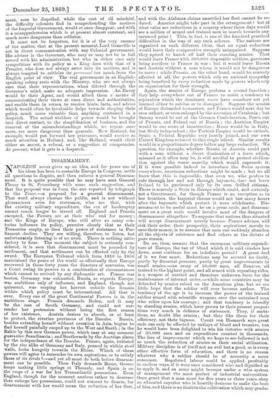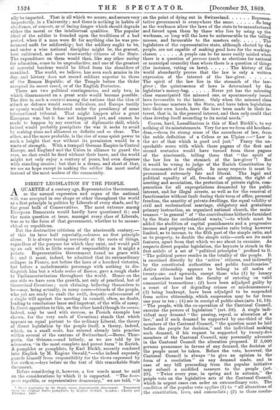DISARMAMENT.
NAPOLEON never gives up an idea, and for years one of his ideas has been to assemble Europe in Congress, settle all questions in dispute, and then enforce a general Disarma- ment. It is quite possible that he may have sent General Fleury to St. Petersburg with some such suggestion, and that the proposal was in form the one reported by telegraph to the Times,—a proposal for a general disarmament. That word always charms the public, and is not without pleasantness even for statesmen, who see that, with the existing military expenditure, the era of bankruptcy cannot much longer be staved off. England and Prussia excepted, the Powers are at their wits' end for money ; and the Kings of Europe, who still after so many cen- turies influence its policy, perceive clearly that as their Treasuries empty, so does their power of resistance to Par- liament decline. They are willing, therefore, to listen, but unfortunately listening is of no avail. There is nothing satis- factory to hear. The moment the subject is seriously con- sidered, it is seen that disarmament must be preceded by settlement, and that settlement can be effected only by the sword. The European Tribunal which from 1816 to 1856 maintained the peace of the world so effectually that Europe recovered in those forty years the disasters of centuries, was a Court owing its powers to a combination of circumstances which cannot be revived by any diplomatic art. France was beaten, Germany was exhausted, Russia, as regards Europe, was ambitious only of influence, and England, though not quiescent, was reaping her harvest outside the domain within which policy must be international. All that is over. Every one of the great Continental Powers is in the ambitious stage. Prussia demands Baden, and it may be the rest of South Germany, and could not sur- render her pretension without losing the first reason of her existence. Austria desires to absorb, or at least to protect, the riverine provinces of the Danube. Russia, besides extending herself without cessation in Asia, begins to find herself painfully cooped up to the West and South ; in the Baltic by this new German power, which may at any moment guarantee Scandinavia ; and Southwards by the Austrian alarm for the independence of the Danube. France, again, irritated by the rise alike of Germany and Italy, penned in within steel walls, looks hungrily towards the Rhine. Which of these powers will agree to surrender its own aspirations, or to satisfy those of its rivals ?—and yet all must do both before disarma- ment can be possible. Then Italy demands Rome, Greece keeps making little springs at Thessaly, and Spain is on the verge of a war for her Transatlantic possessions. Even England, though for the moment anxious rather to decrease than enlarge her possessions, could not consent to disarm, for disarmament with her would mean the reduction of her fleet,
and with the Alabama claims unsettled her fleet cannot be re- duced. America might take part in the arrangement ? but of what value are reductions in a country where three days would see a million of armed and trained men in march towards any menaced point ? This, in fact, is one of the hundred practical difficulties in the way of any such scheme. The nations are organized on such different ideas, that no equal reduction would leave their comparative strength unimpaired. Suppose they agreed to knock off half their standing armies. That would leave France with 300,000 disposable soldiers, garrisons being needless to France in war ; but it would leave 'Russia and Austria without a man whom it would not be dangerous to move ; while Prussia, on the other hand, would be scarcely affected at all, the powers which rely on national sympathy being benefited by every reduction made by powers which rely on organization for their strength.
Again, the armies of Europe perform a second function ; they help everywhere out of France to resist a tendency to separation which the dominant races have somehow not yet learned either to subdue or to disregard. Suppose the armies of Europe disbanded to-morrow, and France would next day be seen unhurt, or even enlarged by the accession of Catalonia ; but Saxony would be out of the German Confederation, Posen out of Prussia, and Poland out of Russia ; the Austrian Empire would be one scene of insurrection ; Rome would be in Italy, but Sicily independent ; the Turkish Empire would be extinct, Spain a Federal Republic very loosely joined, and our own United Kingdom reduced to this single island. Similar results would in a proportionate degree follow any large reduction. We question, for example, whether Russia or Austria could part with a man without a direct diminution of a force which, misused as it often may be, is still needful to protect civiliza- tion against the worse anarchy which would supersede it. If it were possible indeed to introduce the Swiss system everywhere, enormous reductions might be made ; but we all know that this is impossible, that even we, who profess to rule through law and not through bayonets, dare not leave Ireland to be garrisoned only by its own drilled citizens. There is scarcely a State in Europe which could, and certainly not a Government, for though France is an exception as to her frontiers, the Imperial throne would not last many hours after the bayonets which protect it were withdrawn. Dis- armament to be useful must be on a great scale, and disarma- ment on a great scale would involve most of the dangers of disarmament altogether. To suppose that nations thus situated will accept disarmament merely because France advises, will risk their order, their prosperity, their aspirations, merely to save their money, is to assume that men can suddenly abandon all the objects of existence and find others at the dictate of pure reason.
Do we, then, assume that the enormous military expendi- ture of Europe, the tax of blood which it is said crushes her down, must continue for an indefinite period V A great deal of it we fear must. Reductions may be secured no doubt, partly by financial pressure, partly by great improvements in small armies,—an army of 50,000 men, all Zouaves, all trained to the highest point, and all armed with repeating rifles, is a weapon of untried and therefore unknown force for the maintenance of internal order,—while some countries may be defended by armies raised on the American plan, but we see little hope that the soldier will ever become useless. The tendency of the age is to increase the power of the trained soldier armed with scientific weapons over the untrained man who relies upon his courage ; and that tendency is friendly to standing armies, which have grown to their present propor- tions very much in defiance of statesmen. They, if ambi- tious, no doubt like armies ; but they like them for their efficiency, not their bigness. Count von Bismarck says great ends can only be effected by outlays of blood and treasure, but he would have been delighted to win his victories with armies of 30,000 men and an expenditure counted in thousands. The line of improvement which we hope to see followed is not so much the redaction of armies as their social utilization. Military discipline is of itself not an evil but a good, as is every other effective form of education, and there is no reason whatever why a soldier should be of necessity a mere consumer. Regulated labour could be applied profitably in endless ways, if it were once considered wise and dignified so to apply it, and an army might become under a wise system of management the most perfect of industrial universities. Once grant that a man must for five years or three years obey an educated superior who is heartily desirous to make the best of him, and there is no limit to the cultivation which may gradu- ally be imparted. That is all which we secure, and secure very imperfectly, in a University ; and there is nothing in habits of obedience, of concert, or of facing danger which should degrade either the moral or the intellectual qualities. The popular ideal of the soldier is founded upon the traditions of a bad period, when if a man were fit for anything else he was pro- nounced unfit for soldiership ; but the soldiery ought to b0, and under a wise national discipline might be, the gravest, best cultivated, and most trustworthy citizens of the State. The expenditure on them would then, like any other outlay for education, cease to be unproductive, and one of the greatest of material burdens would be lifted from the shoulders of mankind. The world, we believe, has seen such armies in its day, and history does not record soldiers superior to those of the Roman Republic, of the Temple before the Order accepted its secret creed, or of the English Protector.
There are two political contingencies, and only two, in which disarmament on a great scale would become possible. The first is, such a content among the nations that the idea of attack or defence would seem ridiculous, and Europe tacitly or openly would be federated under the presidency of some international tribunal. That might happen after a great European war, but it has not happened yet, and cannot be made to happen by any exertion of diplomatic skill, which indeed would probably precipitate the war it seeks to avoid by making aims and alliances so definite and so clear. The other, and the more probable, is the rise of some quiet power to such a height that war without its permission would be a waste of strength. With a tranquil German Empire in Central Europe, and England and the Union in alliance to guard the seas, no shot could be fired without their leave, and the world might not only enjoy a century of peace, but even dispense with standing armies ; but that is a dream, and short of that, we see no hope except in making the soldier the most useful instead of the most useless of the community.



































 Previous page
Previous page